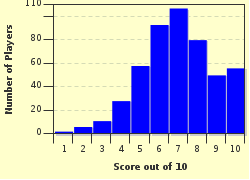Quiz Answer Key and Fun Facts
1. At the beginning of the 19th century, as Humphry Davy described this gas as "capable of destroying physical pain", people had discovered that inhaling small amounts of it created pleasant sensations. Which gas am I talking about?
2. What happened when a dentist from Connecticut, Dr. Horace Wells, publicly demonstrated the use of nitrous oxide?
3. Who coined the term "anesthesia"?
4. What language does anesthesia come from and what does it mean?
5. Which queen took chloroform for pain relief during delivery of her seventh child?
6. What is the main difference between a general and a local anesthetic?
7. Novocain is a local anesthetic.
8. Although anesthetics are the drugs which act chemically on the body's nerves, there are other ways to produce anesthesia. Which one of these methods can create anesthesia?
9. Acupuncture is also a method of anesthesia where very fine needles are inserted underneath the skin and twirled around rapidly. Where in the world was this method developed?
10. Hypnosis can be used in major operations as an anesthetic.
Source: Author
AlexxSchneider
This quiz was reviewed by FunTrivia editor
crisw before going online.
Any errors found in FunTrivia content are routinely corrected through our feedback system.


